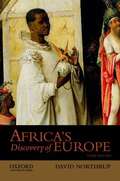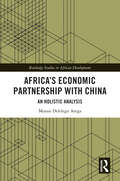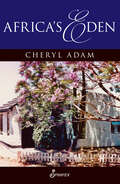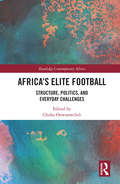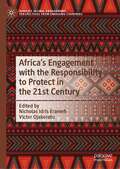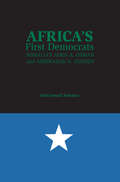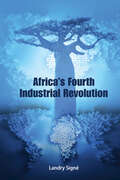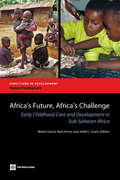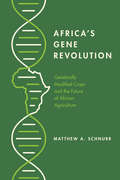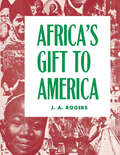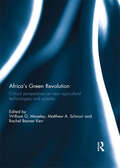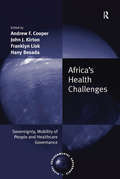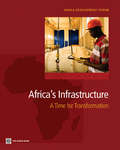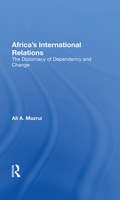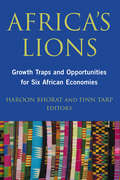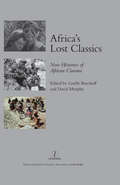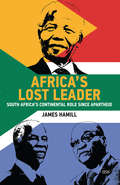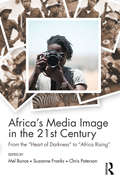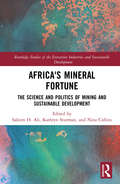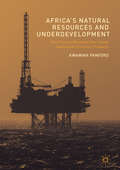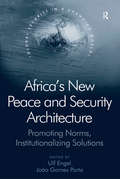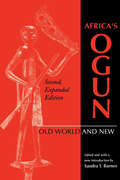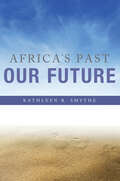- Table View
- List View
Africa's Discovery of Europe (Third Edition)
by David NorthrupThis groundbreaking book examines the full range of African-European encounters from an unfamiliar African perspective rather than from the customary European one. By featuring vivid life stories of individual Africans and drawing upon their many recorded sentiments, David Northrup presentsAfrican perspectives that persuasively challenge stereotypes about African-European relations as they unfolded in Africa, Europe, and the Atlantic world between 1450 and 1850. The text features thematically organized chapters that explore first impressions, religion and politics, commerce and culture, imported goods and technology, the Middle Passage, and Africans in Europe. In addition, Northrup offers a thoughtful examination of Africans' relations - intellectual,commercial, cultural, and sexual - with Europeans, tracing how the patterns of behavior that emerged from these encounters shaped pre-colonial Africa. The book concludes with an examination of the roles of race, class, and culture in early modern times, pointing out which themes in Africa'scontinuing discovery of Europe after 1850 were similar to earlier patterns, and why other themes were different.
Africa’s Economic Partnership with China: An Holistic Analysis (Routledge Studies in African Development)
by Mussie Delelegn AregaThis book examines how increasing Africa-China relations in the fields of trade, development finance and investment have impacted productive capacities and structural economic transformation in sub-Saharan Africa (SSA). The book argues that statistical and empirical evidence shows that China’s influence has not substantially altered the fundamentals in Africa, and instead outlines a framework of policy conclusions and recommendations to help achieve transformational growth and development. Despite increased Chinese investments in transport, energy, communications, and manufacturing, sub-Saharan Africa is yet to see tangible economic and development benefits according to the multidimensional Productive Capacities Index (PCI). External trade is dogged by the same problems as during the colonial era, with primary commodities dominating exports to China, and industrial or manufacturing products dominating imports, thereby leaving the region exposed to external economic shocks. The book considers whether there are lessons to be learned from the experience of Asian countries such as Vietnam, proposing pragmatic, coordinated, non-ideological, and non-confrontational policy approaches to development. This book will be of interest to researchers, policymakers, advisors, academics, and practitioners with an interest in development in Africa, and China’s increasing role in the continent.
Africa's Eden
by Cheryl AdamAs a young unmarried mother in the 1960s, Maureen faces stifling disapproval and condemnation from mainstream society. Desperate to create a new life for herself and her baby, she rekindles an old romance and moves to South Africa under Apartheid. But her precarious journey to Africa's Eden is not the paradise she anticipated. Cultures smash against each other, family relationships are strained, there is death and despair, violence and injustice. But there is also humour, fun, family and friendship, as Maureen has to decide where her future lies. Is it here in Africa or back home in distant Eden, in her Australian homeland?
Africa’s Elite Football: Structure, Politics, and Everyday Challenges (Routledge Contemporary Africa)
by Chuka OnwumechiliThis book explores various aspects of intranational elite football in Africa, drawing on the expertise of notable scholars from across the world. Africa’s Elite Football focuses on an area largely ignored by current scholarship on African football, where interest has focused on international migration. In exploring the intranational, the book is written in two parts. The first is a general focus on the continent, and the second is an examination of country cases. The general focus of the book is on the nature of elite tier leagues, the relationship between politics and football, the media, youth academies, intranational migration and fans. Notably, chapters on topics such as intranational migration present groundbreaking scholarship in this area. Currently, football discourses on migration focus on international migration of footballers, yet the majority of migration in African football is intranational. Thus, by addressing the intranational, this book brings attention to an area that is underrepresented in the current academic discourse. The second part of the book, which focuses on country cases, covers Botswana, Egypt, Kenya, Nigeria, Senegal, Zambia and Zimbabwe. The topics explored in those cases include religiosity, health, women’s football, media and management. The coverage of health-related issues is particularly important given that several books on African football rarely broach such a topic. With its unique approach to African football, this book will be of interest to scholars and students of sports history, African studies, politics in sports and African sports.
Africa's Engagement with the Responsibility to Protect in the 21st Century (Africa's Global Engagement: Perspectives from Emerging Countries)
by Nicholas Idris Erameh Victor OjakorotuThis book sheds light on the practice, challenges, and prospects of the Responsibility to Protect (RtoP) amidst wide contestation, backlash, operational challenges, and expectation gaps associated with the theory and practice of the RtoP. Diverging from existing works, it provides a renewed perspective and alternatives for future deployment of the RtoP and critical insights to the readers on how issues such as support, consolidation, and institutionalization within the broader context of regional dynamics of the RtoP can be best achieved in Africa. The book will be of particular interest to diplomats, international relations experts, scholars, RtoP advocates, the United Nations, and the African Union.
Africa’s First Democrats: Somalia’s Aden A. Osman and Abdirazak H. Hussen
by Abdi Ismail SamatarAbdi Ismail Samatar provides a clear and foundational history of Somalia at the dawn of the country's independence when Africa's first democrats appeared. While many African countries were dominated by authoritarian rulers when they entered the postcolonial era--and scholars have assumed this as a standard feature of political leadership on the continent--Somalia had an authentic democratic leadership. Samatar's political biography of Aden A. Osman and Abdirazak H. Hussen breaks the stereotype of brutal African tyranny. Samatar discusses the framing of democracy in Somalia following the years of control by fascist Italy, the formation of democratic organizations during the political struggle, and the establishment of democratic foundations in the new nation. Even though this early state of affairs did not last, these leaders left behind a strong democratic legacy that may provide a model of good governance for the rest of the continent.
Africa's Future, Africa's Challenge: Early Childhood Care and Development in Sub-saharan Africa
by Marito H. Garcia Alan Pence Judith EvansEarly childhood, from birth through school entry, was largely invisible worldwide as a policy concern for much of the twentieth century. Children, in the eyes of most countries, were 'appendages' of their parents or simply embedded in the larger family structure. The child did not emerge as a separate social entity until school age (typically six or seven). 'Africa's Future, Africa's Challenge: Early Childhood Care and Development in Sub-Saharan Africa' focuses on the 130 million children south of the Sahel in this 0-6 age group. This book, the first of its kind, presents a balanced collection of articles written by African and non-African authors ranging from field practitioners to academicians and from members of government organizations to those of nongovernmental and local organizations. 'Africa's Future, Africa's Challenge' compiles the latest data and viewpoints on the state of Sub-Saharan Africa's children. Topics covered include the rationale for investing in young children, policy trends in early childhood development (ECD), historical perspectives of ECD in Sub-Saharan Africa including indigenous approaches, new threats from HIV/AIDS, and the importance of fathers in children's lives. The book also addresses policy development and ECD implementation issues; presents the ECD programming experience in several countries, highlighting best practices and challenges; and evaluates the impact of ECD programs in a number of countries.
Africa's Gene Revolution: Genetically Modified Crops and the Future of African Agriculture
by Matthew A. SchnurrAs development donors invest hundreds of millions of dollars into improved crops designed to alleviate poverty and hunger, Africa has emerged as the final frontier in the global debate over agricultural biotechnology. The first data-driven assessment of the ecological, social, and political factors that shape our understanding of genetic modification, Africa's Gene Revolution surveys twenty years of efforts to use genomics-based breeding to enhance yields and livelihoods for African farmers. Matthew Schnurr considers the full range of biotechnologies currently in commercial use and those in development – including hybrids, marker-assisted breeding, tissue culture, and genetic engineering. Drawing on interviews with biotechnology experts alongside research conducted with more than two hundred farmers across eastern, western, and southern Africa, Schnurr reveals a profound incongruity between the optimistic rhetoric that accompanies genetic modification technology and the realities of the smallholder farmers who are its intended beneficiaries. Through the lens of political ecology, this book demonstrates that the current emphasis on improved seeds discounts the geographic, social, ecological, and economic contexts in which the producers of these crops operate. Bringing the voices of farmers to the foreground of this polarizing debate, Africa's Gene Revolution contends that meaningful change will come from a reconfiguration not only of the plant's genome, but of the entire agricultural system.
Africa's Gene Revolution: Genetically Modified Crops and the Future of African Agriculture
by Matthew A. SchnurrAs development donors invest hundreds of millions of dollars into improved crops designed to alleviate poverty and hunger, Africa has emerged as the final frontier in the global debate over agricultural biotechnology. The first data-driven assessment of the ecological, social, and political factors that shape our understanding of genetic modification, Africa's Gene Revolution surveys twenty years of efforts to use genomics-based breeding to enhance yields and livelihoods for African farmers. Matthew Schnurr considers the full range of biotechnologies currently in commercial use and those in development - including hybrids, marker-assisted breeding, tissue culture, and genetic engineering. Drawing on interviews with biotechnology experts alongside research conducted with more than two hundred farmers across eastern, western, and southern Africa, Schnurr reveals a profound incongruity between the optimistic rhetoric that accompanies genetic modification technology and the realities of the smallholder farmers who are its intended beneficiaries. Through the lens of political ecology, this book demonstrates that the current emphasis on improved seeds discounts the geographic, social, ecological, and economic contexts in which the producers of these crops operate. Bringing the voices of farmers to the foreground of this polarizing debate, Africa's Gene Revolution contends that meaningful change will come from a reconfiguration not only of the plant's genome, but of the entire agricultural system.
Africa's Gift to America: The Afro-American in the Making and Saving of the United States
by J. A. RogersOriginally published in 1959 and revised and expanded in 1989, this book asserts that Africans had contributed more to the world than was previously acknowledged. Historian Joel Augustus Rogers devoted a significant amount of his professional life to unearthing facts about people of African ancestry. He intended these findings to be a refutation of contemporary racist beliefs about the inferiority of blacks. Rogers asserted that the color of skin did not determine intellectual genius, and he publicized the great black civilizations that had flourished in Africa during antiquity. According to Rogers, many ancient African civilizations had been primal molders of Western civilization and culture.
Africa’s Green Revolution: Critical Perspectives on New Agricultural Technologies and Systems
by William G. Moseley, Matthew A. Schnurr and Rachel Bezner KerrThis volume examines the dominant neoliberal agenda for agricultural development and hunger alleviation in Africa. The text reviews the history of African agricultural and food security policy in the post-colonial period, across a range of geographical contexts, in order to contextualise the productionist approach embedded in the much heralded New Green Revolution for Africa. This strategy, supported by a range of international agencies, promotes the use of hybrid seeds, fertilisers, and pesticides to boost crop production. This approach is underpinned by a new and unprecedented level of public–private partnerships as donors actively work to promote the private sector and build links between African farmers, input suppliers, agro-dealers, agro-processors, and retailers. On the consumer end, increased supermarket penetration into poorer neighbourhoods is proffered as a solution to urban food insecurity. The chapters in this volume complicate understandings of this new approach and raise serious questions about its effectiveness as a strategy for increasing food production and alleviating poverty across the continent.This book is based on a special issue of African Geographical Review.
Africa's Health Challenges: Sovereignty, Mobility of People and Healthcare Governance (Global Environmental Governance)
by Hany Besada Andrew F. Cooper John J. Kirton Franklyn LiskThis volume addresses the ideational and policy-oriented challenges of Africa’s health governance due to voluntary and involuntary cross-border migration of people and diseases in a growing 'mobile Africa'. The collected set of specialized contributions in this volume examines how national and regional policy innovation can address the competing conception of sovereignty in dealing with Africa’s emerging healthcare problems in a fast-paced, interconnect world.
Africa's Infrastructure: A Time for Transformation
by World BankSustainable infrastructure development is vital for Africa's prosperity. And now is the time to begin the transformation. This volume is the culmination of an unprecedented effort to document, analyze, and interpret the full extent of the challenge in developing Sub-Saharan Africa's infrastructure sectors. As a result, it represents the most comprehensive reference currently available on infrastructure in the region. The book covers the five main economic infrastructure sectors-information and communication technology, irrigation, power, transport, and water and sanitation. 'Africa's Infrastructure: A Time for Transformation' reflects the collaboration of a wide array of African regional institutions and development partners under the auspices of the Infrastructure Consortium for Africa. It presents the findings of the Africa Infrastructure Country Diagnostic (AICD), a project launched following a commitment in 2005 by the international community (after the G8 summit at Gleneagles, Scotland) to scale up financial support for infrastructure development in Africa. The lack of reliable information in this area made it difficult to evaluate the success of past interventions, prioritize current allocations, and provide benchmarks for measuring future progress, hence the need for the AICD. Africa's infrastructure sectors lag well behind those of the rest of the world, and the gap is widening. Some of the main-policy-relevant-findings highlighted in the book include the following: infrastructure in the region is exceptionally expensive, with tariffs being many times higher than those found elsewhere. Inadequate and expensive infrastructure is retarding growth by 2 percentage points each year. Solving the problem will cost over US$90 billion per year, which is more than twice what is being spent in Africa today. However, money alone is not the answer. Prudent policies, wise management, and sound maintenance can improve efficiency, thereby stretching the infrastructure dollar. There is the potential to recover an additional US$17 billion a year from within the existing infrastructure resource envelope-simply by improving efficiency. For example, improved revenue collection and utility management could generate US$3.3 billion per year. Regional power trade could reduce annual costs by US$2 billion. And deregulating the trucking industry could reduce freight costs by one-half. So, raising more funds without also tackling inefficiencies would be like pouring water into a leaking bucket. Finally, the power sector and fragile states represent particular challenges. Even if every efficiency in every infrastructure sector could be captured, a substantial funding gap of $31 billion a year would remain. Nevertheless, the African people and economies cannot wait any longer. Now is the time to begin the transformation to sustainable development.
Africa's International Relations: The Diplomacy Of Dependency And Change
by Ali A MazruiThe author presents a journey through African and Western history, culture and politics. By essaying Africa's international relations, Mazrui returns to an important truth: the power of race and culture in Africa's relations with the West. Discussing African political formation, his overriding theme, not unpredictably, is assimilation - of the enti
Africa's Lions: Growth Traps and Opportunities for Six African Economies
by Finn Tarp Haroon BhoratExamining the economic forces that will shape Africa's future.Africa's Lions examines the economic growth experiences of six fast growing and/or economically dominant African countries. Expert African researchers offer unique perspectives into the challenges and issues in Ethiopia, Ghana, Kenya, Mozambique, Nigeria, and South Africa.Despite a growing body of research on African economies, very little has focused on the relationship between economic growth and employment outcomes at the detailed country level. A lack of empirical data has deprived policymakers of a robust evidence base on which to make informed decisions. By harnessing country-level household, firm, and national accounts data together with existing analytical country research-the authors have attempted to bridge this gap.The growth of the global working-age population to 2030 will be driven primarily by Africa, which means that the relationship between growth and employment should be understood within the context of each country's projected demographic challenge and the associated implications for employment growth. A better understanding of the structure of each country's workforce and the resulting implications for human capital development, the vulnerably employed, and the working poor, will be critical to informing the development policy agenda.As a group, the six countries profiled in Africa's Lions will largely shape the continent's future. Each country chapter focuses on the complex interactions between economic growth and employment outcomes, within the individual Africa's Lions context.
Africa's Lost Classics: New Histories of African Cinema
by Lizelle BisschoffUntil recently, the story of African film was marked by a series of truncated histories: many outstanding films from earlier decades were virtually inaccessible and thus often excluded from critical accounts. However, various conservation projects since the turn of the century have now begun to make many of these films available to critics and audiences in a way that was unimaginable just a decade ago. In this accessible and lively collection of essays, Lizelle Bisschoff and David Murphy draw together the best scholarship on the diverse and fragmented strands of African film history. Their volume recovers over 30 'lost' African classic films from 1920-2010 in order to provide a more complex genealogy and begin to trace new histories of African filmmaking: from 1920s Egyptian melodramas through lost gems from apartheid South Africa to neglected works by great Francophone directors, the full diversity of African cinema will be revealed.
Africa's Lost Leader: South Africa's continental role since apartheid
by James HamillWhen Nelson Mandela was sworn in as president on 10 May 1994, South Africa enjoyed an unprecedented global standing. Much of the international community, particularly Western states, saw the new South Africa as well equipped to play a dynamic and dominant role on the continent; promoting conflict resolution, economic development, and acting as a standard-bearer for democracy and human rights.Yet, throughout the presidencies of Nelson Mandela, Thabo Mbeki and Jacob Zuma, South Africa has failed to deliver on this early promise. Its continental primacy has been circumscribed by its own reluctance to lead, combined with widespread African hostility to its economic expansion, antipathy towards its democratic ideals and scepticism about its suitability as Africa�s global representative. With an onerous domestic agenda, as it continues to tackle the profound socio-economic legacies of apartheid, and with its military power also on the wane, South Africa must now adapt to an emerging multipolarity on the continent. This transition � which may produce a new concert of African powers working in constructive collaboration or lead to fragmentation, discord and gridlock � is likely to determine Africa�s prospects for decades to come.This Adelphi book squarely challenges the received wisdom that South Africa is a dominant power in Africa. It explores the country�s complex and difficult relationship with the rest of the continent in the post-apartheid era and examines the ways in which the country has struggled to translate its economic, military and diplomatic weight into tangible foreign policy successes and enduring influence on the ground. The conclusions of this book will be valuable to academics, policymakers, journalists, and business leaders seeking to understand the evolution and trajectory of South African policy in Africa.
Africa's Media Image in the 21st Century: From the "Heart of Darkness" to "Africa Rising" (Communication and Society)
by Suzanne Franks Mel Bunce Chris PatersonAfrica’s Media Image in the 21st Century is the first book in over twenty years to examine the international media’s coverage of sub-Saharan Africa. It brings together leading researchers and prominent journalists to explore representation of the continent, and the production of that image, especially by international news media. The book highlights factors that have transformed the global media system, changing whose perspectives are told and the forms of media that empower new voices. Case studies consider questions such as: how has new media changed whose views are represented? Does Chinese or diaspora media offer alternative perspectives for viewing the continent? How do foreign correspondents interact with their audiences in a social media age? What is the contemporary role of charity groups and PR firms in shaping news content? They also examine how recent high profile events and issues been covered by the international media, from the Ebola crisis, and Boko Haram to debates surrounding the "Africa Rising" narrative and neo-imperialism. The book makes a substantial contribution by moving the academic discussion beyond the traditional critiques of journalistic stereotyping, Afro-pessimism, and ‘darkest Africa’ news coverage. It explores the news outlets, international power dynamics, and technologies that shape and reshape the contemporary image of Africa and Africans in journalism and global culture.
Africa's Mineral Fortune: The Science and Politics of Mining and Sustainable Development (Routledge Studies of the Extractive Industries and Sustainable Development)
by Saleem H. Ali Kathryn Sturman Nina CollinsFor too long Africa's mineral fortune has been lamented as a resource curse that has led to conflict rather than development for much of the continent. Yet times are changing and the opportunities to bring technical expertise on modern mining alongside appropriate governance mechanisms for social development are becoming more accessible in Africa. This book synthesizes perspectives from multiple disciplines to address Africa’s development goals in relation to its mineral resources. The authors cover ways of addressing a range of policy challenges, environmental concerns, and public health impacts and also consider the role of globalization within the extractive industries. Academic research is coupled with key field vignettes from practitioners exemplifying case studies throughout. The book summarizes the challenges of natural resource governance, suggesting ways in which mining can be more effectively managed in Africa. By providing an analytical framework it highlights the essential intersection between natural and social sciences, central to efficient and effective harnessing of the potential for minerals and mining to be a contributor to positive development in Africa. It will be of interest to policy makers, industry professionals, and researchers in the extractive industries, as well as to the broader development community.
Africa’s Natural Resources and Underdevelopment: How Ghana’s Petroleum Can Create Sustainable Economic Prosperity
by Kwamina PanfordThis book explores how African countries can convert their natural resources, particularly oil and gas, into sustainable development assets. Using Ghana, one of the continent's newest oil-producing countries, as a lens, it examines the "resource curse" faced by other producers - such as Nigeria, Angola, and Equatorial Guinea - and demonstrates how mismanagement in those countries can provide valuable lessons for new oil producers in Africa and elsewhere. Relying on a broad range of fieldwork and policymaking experience, Panford suggests practical measures for resource-rich developing countries to transform natural resources into valuable assets that can help create jobs, boost human resources, and improve living and working conditions in Ghana in particular. He suggests fiscal, legal, and environmental antidotes to resource mismanagement, which he identifies as the major obstacle to socioeconomic development in countries that have historically relied on natural resources.
Africa's New Peace and Security Architecture: Promoting Norms, Institutionalizing Solutions (Global Security in a Changing World)
by J. Gomes PortoThis volume offers an informed and critical analysis of the operationalization and institutionalization of the peace and security architecture by the African Union and Africa's Regional Economic Communities (RECs). In creating this architecture, the African Union and the RECs tread new ground with potentially significant consequences to the lives and livelihoods of millions of Africans who are affected by war and armed conflict. In-depth, critical chapters inform, clarify and provide key points for reflection on the architecture as a whole as well as on each of the structures currently under implementation. The volume examines the institutions that will carry the mandate forward, raises pertinent research questions for the successful operationalization of the architecture and debates the medium and long-term challenges to implementation. Students and researchers of African approaches to peace building, conflict resolution and regional security will benefit from the deep and critical engagement of issues covered in this volume by world renowned scholars and practitioners.
Africa's Ogun: Old World and New
by Sandra T. BarnesThis landmark work of ethnography explores the enduring, global worship of the African god of war—with five new essays in this new, expanded edition.Ogun—the ancient African god of iron, war, and hunting—is worshiped by more than forty million adherents in Western Africa, the Caribbean, and the Americas. This rich, interdisciplinary collection draws on field research from several continents to reveal Ogun’s dramatic power and enduring appeal.Contributors examine the history and spread of Ogun throughout old and new worlds; the meaning of Ogun ritual, myth, and art; and the transformations of Ogun through the deity’s various manifestations. This edition includes five new essays focusing mainly on Ogun worship in the new world.“[A]n ethnographically rich contribution to the historical understanding of West African culture, as well as an exploration of the continued vitality of that culture in the changing environments of the Americas.” —African Studies Review
Africa's Oil Abundance and External Competitiveness: Do Institutions Matter?1
by Mahvash Saeed QureshiFinancial report from the IMF
Africa's Past, Our Future
by Kathleen R. SmytheAfrica's Past, Our Future engages the history of the African continent through the perspective of global issues such as political instability, economic development, and climate change. Since the past may offer alternative models for thinking about our collective future, this book promotes an appreciation for African social, economic, and political systems that have endured over the long-term and that offer different ways of thinking about a sustainable future. Introducing readers to the wide variety of sources from which African history is constructed, the book's ten chapters cover human evolution, the domestication of plants and animals, climate change, social organization, the slave trade and colonization, development, and contemporary economics and politics.
